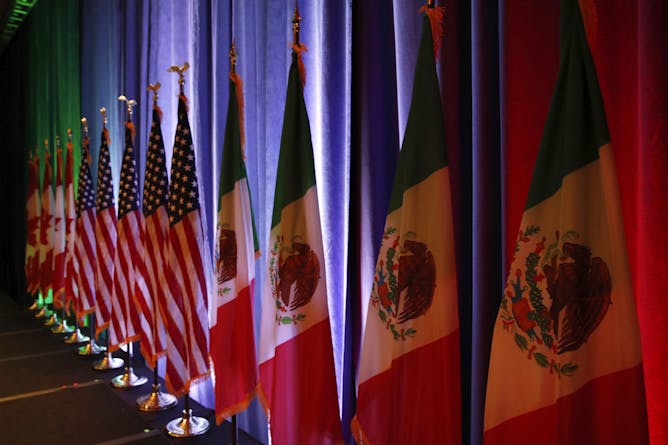|
You know the old saying: Two’s company, three’s a crowd. Is that the situation now with the NAFTA negotiations? Today in The Conversation Canada, Drew Fagan of the University of Toronto provides an analysis on how Canada has suddenly found itself on the outside looking in when it comes to trade discussions with the United States and Mexico.
It’s almost the 10th anniversary of the economic meltdown of 2008. The U.S. Federal Reserve played a critical role in trying to minimize the recession. Hoa Trinh of the University of Toronto explains how a monetary policy created a decade ago has left the financial system awash with money.
It’s been a blockbuster year for astronomers. Gregory Sivakoff of the University of Alberta and Daryl Haggard of McGill University tell us how scientists have new tools at their disposal when analyzing the mysteries of the cosmos.
And finally…it’s only a few days until parents will need to start making school lunches for their kids. But instead of bringing food from home, Sara Kirk of Dalhousie University and Amberley Ruetz of the University of Guelph make the case for the creation of a national school food program, which among other things could teach children healthy eating habits that could last a lifetime.
Regards,
|

The national flags of Canada, from left, the U.S. and Mexico, are lit by stage lights before a news conference at the start of North American Free Trade Agreement renegotiations in Washington. But Canada’s status is now unsure after the U.S. and Mexico announced progress on a bilateral deal.
AP Photo/Jacquelyn Martin
Drew Fagan, University of Toronto
An announcement that the United States and Mexico were close to a new trade deal came as a surprise to many. How did Canada become an afterthought during the NAFTA negotiations?
|

The financial system is awash with money, which is why interest rates have been so low for so long.
(Shutterstock)
Hoa Trinh, University of Toronto
It's been 10 years since the U.S. signed into law a scheme to print money, essentially, and save the financial sector amid the sub-prime mortgage meltdown. Did it work? And who's truly benefitted?
|

An illustration of two neutron stars spinning around each other while merging.
NASA/CXC/Trinity University/D. Pooley et al.
Gregory Sivakoff, University of Alberta; Daryl Haggard, McGill University
Astronomers are now able to detect a host of signals streaming through the universe. This newfound ability is like gaining new senses and it's opening the door to understanding the cosmos.
|

In Rome, 70 per cent of ingredients in school meals are required by law to be organic. In Brazil, food is a constitutional right for children. Canada lags shamefully behind.
(Shutterstock)
Sara FL Kirk, Dalhousie University; Amberley T. Ruetz, University of Guelph
There would be many benefits from a national school food program, including a chance to teach children healthy eating habits that could last a lifetime. Why can't it happen?
|
Culture + Society
|
-
Katharine Jenkins, University of Nottingham
The UK government is consulting on changing gender recognition laws. Here's what you need to know.
|
|
Health + Medicine
|
-
Mike Armour, Western Sydney University; Jane Chalmers, Western Sydney University; Melissa Parker, ACT Health
Endometriosis can cause a number of severe symptoms, including period pain. But painful periods alone aren't a surefire indicator of endometriosis. Here's what else to look out for.
|
|
Politics
|
-
David B. Moore, University of Johannesburg
Zimbabwe's new president promised to deliver the country citizens want but the nation remains on edge.
|
|